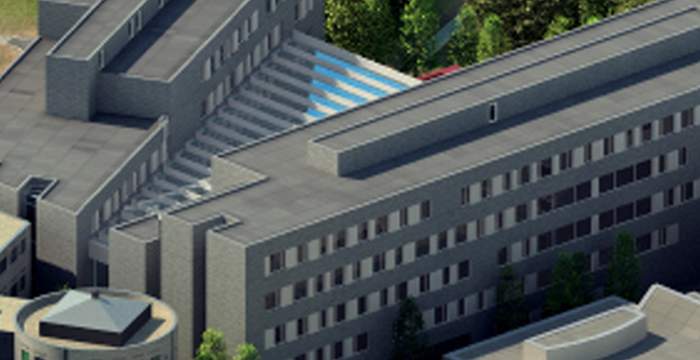Lisa Sanderink is an Assistant Professor at the Section of Governance and Technology for Sustainability (CSTM). She is involved in the Breaking Silos project, which examines the EU Cities Mission as a governance innovation to accelerate climate-neutrality in cities. The project focuses on implementation and impact of the EU Cities Mission in Amsterdam and Stockholm, in collaboration with the Swedish Institute of International Affairs and Lund University.
Her broader research interests include climate and energy governance, particularly the complexities of governance structures and their effectiveness. Lisa’s work has been published in scientific journals such as Energy Policy, Energy Research & Social Science and Global Environmental Politics, as well as in edited volumes by Cambridge University Press and Routledge. She is active in scientific networks such as the Earth System Governance network and European Consortium for Political Research.
In addition to her research, Lisa serves as a representative on the Kennisloket for the Nieuwe Energie Overijssel initiative, reviewing inquiries from municipalities, citizen initiatives, companies and other organizations facing energy transition challenges. In collaboration with Saxion and Windesheim, she connects these organizations with existing knowledge, student assignments, and new research initiatives. She also contributes to the BMS Ethics Committee and the Program Committee for the Master Environmental and Energy Management.
Before joining the University of Twente, Lisa Sanderink worked as a policy officer at the Ministry of Economic Affairs and Climate Policy, focusing on policies for the energy transition and low-carbon energy supply in the Netherlands. She earned her PhD from VU University in Amsterdam with a thesis on the governance structure of the climate-energy nexus. Lisa holds an MSc Environment and Resource Management from the VU University, and a premaster International and European Law and BA European Studies from the University of Amsterdam.
Expertise
Social Sciences
- Project
- Governance
- Climate
- Energy Transition
- Renewable Energy
- Organizations
- Architecture
Computer Science
- Fragmentation
Organisations
Publications
2025
2023
2022
Research profiles
Courses academic year 2025/2026
Courses in the current academic year are added at the moment they are finalised in the Osiris system. Therefore it is possible that the list is not yet complete for the whole academic year.
- 194128030 - Master Thesis PA
- 194128051 - Master Thesis European Studies
- 201700116 - Energy Management
- 201800370 - Comparative Public Governance
- 201900129 - Case Project Energy Management
- 202001451 - Research Proposal
- 202001452 - Master Thesis Energy Management
- 202001453 - Master Thesis Environmental Management
- 202001454 - Master Thesis Water Management
- 202300122 - Policy and Sustainability
Courses academic year 2024/2025
- 194128030 - Master Thesis PA
- 194128051 - Master Thesis European Studies
- 201700116 - Energy Management
- 201800370 - Comparative Public Governance
- 201900129 - Case Project Energy Management
- 202001451 - Research Proposal
- 202001452 - Master Thesis Energy Management
- 202001453 - Master Thesis Environmental Management
- 202001454 - Master Thesis Water Management
- 202300122 - Policy and Sustainability
Current projects
SUSTENANCE - EU HORIZON2020
Sustainable energy system for achieving novel carbon neutral energy communities
The overall purpose of the SUSTENANCE (Sustainable Energy System for Achieving Novel Carbon Neutral Energy Communities) project is to create novel sustainable and carbon neutral energy communities.
Buurtbatterij in de Weverij - DEI+
Neighborhood level energy storage
The aim of this project is to develop a system, consisting of storage (electricity and heat), electric heat pumps and PVT panels, combined with a novel energy management system to increase the flexibility within the energy system. This system will be tested in a pilot project with newly built houses in the former “weverij” in Almelo.
SERENE - EU HORIZON2020
Sustainable and integrated energy systems in local communities
The aim of the SERENE (Sustainable and Integrated Energy Systems in Local Communities) project is to develop and demonstrate sustainable, integrated, cost-effective and customer centric solutions for local communities.
Breaking silos
Can the EU’s mission approach for climate-neutral cities accelerate energy transitions?
Innovative ideas and working methods are needed to speed up sustainable energy transitions in line with the goals of the Paris Agreement. Previous studies have shown the importance of breaking silos between institutions to accelerate this transition. This project investigates how an innovative governance approach - the EU's mission for climate-neutral cities - can increase the pace of energy transitions. For this purpose, we study two cities that have been selected to participate in the EU’s mission approach: Stockholm and Amsterdam. The overarching research question of the project is: To what extent and how can the mission approach contribute to an acceleration of energy transitions in cities? Specifically, in the context of the European Cities Mission it will (1) map out the mission approach, (2) analyse how it works in practice, and (3) evaluate its effects in Stockholm and Amsterdam. In particular, it will investigate if and how the mission approach can break up silos horizontally (for instance within a city administration and public/private actors domestically) and vertically (for instance within transnational networks and international institutions) and how it can impact energy transitions both in terms of reducing emissions but also from the perspective of social justice. The project will contribute to research, policy, and practice with an understanding of how the mission approach can break up silos and provide approaches and tools to accelerate sustainable energy transitions towards net-zero emissions. The project runs between 2023 – 2025.
Address

University of Twente
Ravelijn (building no. 10), room 1135
Hallenweg 17
7522 NH Enschede
Netherlands
University of Twente
Ravelijn 1135
P.O. Box 217
7500 AE Enschede
Netherlands